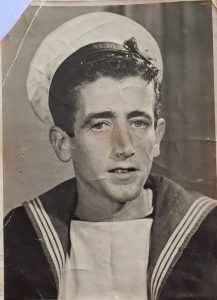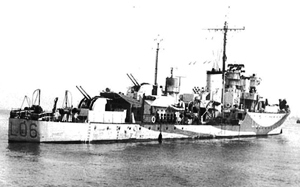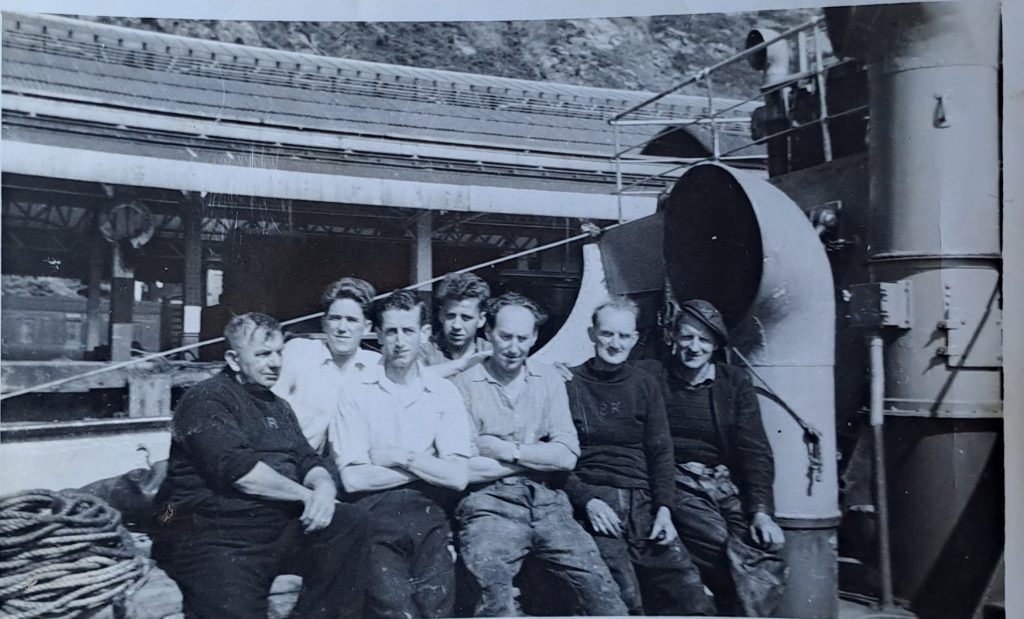For this month’s blog, I want to share something very special. It’s an edited transcript of a recording made by the late Stephen Whitty of Passage East, who served in the Royal Navy in WWII and Korean War, rising to the rank of Petty Officer. Stephen later worked on the mail boats, serving as Quartermaster on the Great Western. It was provided to me by his daughter, Helen, from a recording made by his granddaughter, Stephanie Keane, in 2003. Stephen provides insight into his service in the war, as well as his experiences leading up to it and his life afterwards.
Stephen was born in Barrack Street, Passage East on 5th November 1922. He was the fourth of six children. In 1929 his mother died and shortly after making his Holy Communion in Crooke church, his aunt, Ellen Parker, brought Stephen, his brother Billy and sister Ellen to live with her in Liverpool.
As Stephen recorded:
“We had gone to a catholic church school called Our Lady of Mount Carmel in Liverpool. Just around the corner from the placed I lived in. That’s where I finished my education and made my confirmation there at the age of ten. I eventually left school at the age of fourteen. From there I got a job in a greengrocers shop in Liverpool and then a builders shop. It was always a wish of mine to go to sea. My father and my eldest brother, God be merciful to them, were in the British merchant navy, sailing on ships with no protection. I was going to make sure I was on a ship with guns to defend myself.”
Stephen went to the SW of England where he did his basic training at a shore base called HMS Raleigh. Following a short period of leave, spent in Passage East, he returned to further his training with an intensive course in gunnery, seamanship and survival. But as Stephen recalled, “Little did I know what was ahead of me, or prepared for what was to come…”

Stephen as a young recruit to the Royal Navy. Photo courtesy of Helen Whitty from her father’s collection.
His first ship was a destroyer called the HMS Avon Vale. He served on the North and South Atlantic convoys as they tried to shepherd merchant shipping to keep the Allied war efforts and the citizens provisioned and secure. Battling mountainous seas, icebergs, freezing fog, U Boats and dive bombers the Battle of the Atlantic was a sustained exhausting ordeal requiring constant vigilance and preparedness.
In late 1942 HMS Avon Vale was transferred to the 59th Destroyer Division, joining the escort destroyers Calpe, Farndale and Puckeridge at Gibraltar for convoy defence duties in the western Mediterranean. This was named Operation Torch a crucial and successful mission to land and resource a combined American/British forces on three fronts in North Africa. As Stephen states:
“Our position as an escort destroyer changed from Freetown to the Mediterranean area. Eventually, a couple of weeks later, the port of Algiers. The success of the operation was very good, thank God, and we started operating then escorting convoys to a place called Bone North Africa, 25 miles from the German and Italian positions. We done several convoys to this place and returned back to our base at Algiers for a few days, then to Oran then to Casablanca on the west coast of Africa for a few days well earned rest and a few runs ashore. After ten days we left there and returned back to Algiers.”
While at Algiers, he went ashore and to his surprise, although it was his first time in the city, he felt that he had been there before and confidentally wandered the streets without a care in the world. Comining upon a department store, similar to a Woolworths, he entered the door and in the midst of hundreds of service men, bumped into a relative who was serving in the RAF. However, his luck was about to turn. Their next escort duty would end in tragedy for many crewmates.
“On the 29th January 1943 we escorted a convoy into a place called Bone close to Tunis. We left Algiers at 7.30 and approached a place called Bougie – [to the east between Algiers and Bone] – at about half past eight that night our other destroyer called HMS Marne was on the inside of the convoy, we were on the outside. She got torpedoed at the stern of the ship and we turned immediately to starboard to see if we could help but unfortunately another submarine attacked us and the submarines torpedo hit us in the for’ad part in the magazine. Storage for ammunition. The ship part up for’ad just disintegrated and blew up…with the loss of 37 crew members none left even if we could even find bits, but thank God, the front part of the boiler room, between the bridge and the keel of the ship remained intact and we were able to steam slowly back to Bougie”
According to the RN records, the ship was torpedoed from the air, not a submarine, but I’m sure it would be an academic point to Stephen. His ship was thereafter towed back to Gibraltar by the escort destroyer Bicester. Temporary repairs were carried out in February to ensure Avon Vale could cross the Bay of Biscay for permanent repairs, eventually she was towed back to the United Kingdom on 25 June as part of convoy MKS15.

HMS Avon Vale. Imperial War Museum online collection.
Meanwhile Stephen had returned to the UK and was “sent on a marvellous ten day survivors leave” before going on a training course in Scotland on mine sweeping. He then joined HMS Rosario, a ship he described as “a Spanish name for the rosary. I viewed this as my lucky ship”. Built by Harland and Wolff, Belfast the vessel was launched in 1943. He sailed on the ship again to the Mediterranean, where she provided escort duties initially and later mine clearance operations to allow access to Italy, Sardinia, Elba and Marseille. Moving later towards the Adriatic he finished off the war operating out of Piraeus – the port city of Athens, Greece, an area of immense strategic value to all sides. Stephen spent 2 ½ years on the Rosario during which time he progressed in his training and his position.
“After 8 months I went through an examination which I passed thank God for leading seaman. [In a] few more months I passed another examination for a junior officer in the Royal Navy – a petty officer.”

A postcard home from Trieste, June 1945 on his cruise home. Photo courtesy of Helen Whitty from her father’s collection.
Following the war, he came home on what he called “a peacetime cruise around the Italian coast and the Riviera’s, wonderful time, back to Gribralta and then back to Portsmouth.” Stephen would continue to serve in the Royal Navy up to and including the Korean War, ending up his service with the HMS Amethyst in March 1954. He had married May Mellor, also of Barrack St, Passage East in 1949 and their first child was born while he was away at sea. As Stephen states
“I left Passage East in June of that year [1950] for the Korean war my first child, my daughter Marian, our daughter, was born on the 1 August 1950. I never met her, until 2 years later in 17 May 1952, a complete stranger and it took me many months to get used to her, and her to get used to me. I left the Royal Navy in 1954 in the month of March. After a few months at home, I re-joined the British Railway ships serving Fishguard to Rosslare. After another four months I was transferred to a ship called the Great Western for the Fishguard Waterford service and I was able to get home at least three times a week and then have a weeks leave. It was a very, very, very happy time”
Stephen retired in October 1984. For many of years after he showed visitors around the village and shared many of his seafaring memories and the history of his place. But after all those years afloat, all the sites and foreign adventures, Stephen finished his recording with thoughts of his wife May and their family.
“Thank God we are still living happily in our own house. We have four children; Two women, two sons. Ten grandchildren and five great grandchildren. Thank God for everything they have given us.”

Stephen is seen her with his arms folded, looking at the camera with some of his Great Western crewmates at Fishguard in the 1960s. Photo courtesy of Alice Walsh. Her dad Jim is on Stephens’ left.
Stephen recorded this in 2003. He died on the 8 Sept 2006, aged 83 years. May died on 20 July 2007, aged 84 years. They are buried together in Crooke graveyard.
I am deeply indebted to Helen Whitty for providing the recording and many of the images for this piece. Also to her niece Stephanie, who had the tremendous foresight to get Stephen to record his memories. This is part of a larger project I am currently involved with Waterford Treasures on, and a planned conference and exhibition which will take place in Waterford in November. More details will follow.
Tides & Tales
We are a community-based initiative, created with passion, sustained by curiosity, and kept afloat by the generosity of people like you. If Tides and Tales has informed, inspired, or simply entertained you, there are several meaningful ways you can help us continue our work.
Share this story with a friend, family member, or colleague. Leave a comment with feedback. Subscribe below to stay connected with our latest content. Other ways to assist financially if you can, include;
Donate—even a small contribution helps us keep the stories flowing.
Visit our shop and consider a purchase; all proceeds directly support the project.
Every positive action, big or small, helps us to keep Waterford Harbour’s rich maritime legacy alive and accessible for generations to come. Thank you for being part of the journey.

Great read, he won his lotto on the 29 January, 1943.
Wonderful story Andrew of a life well lived!